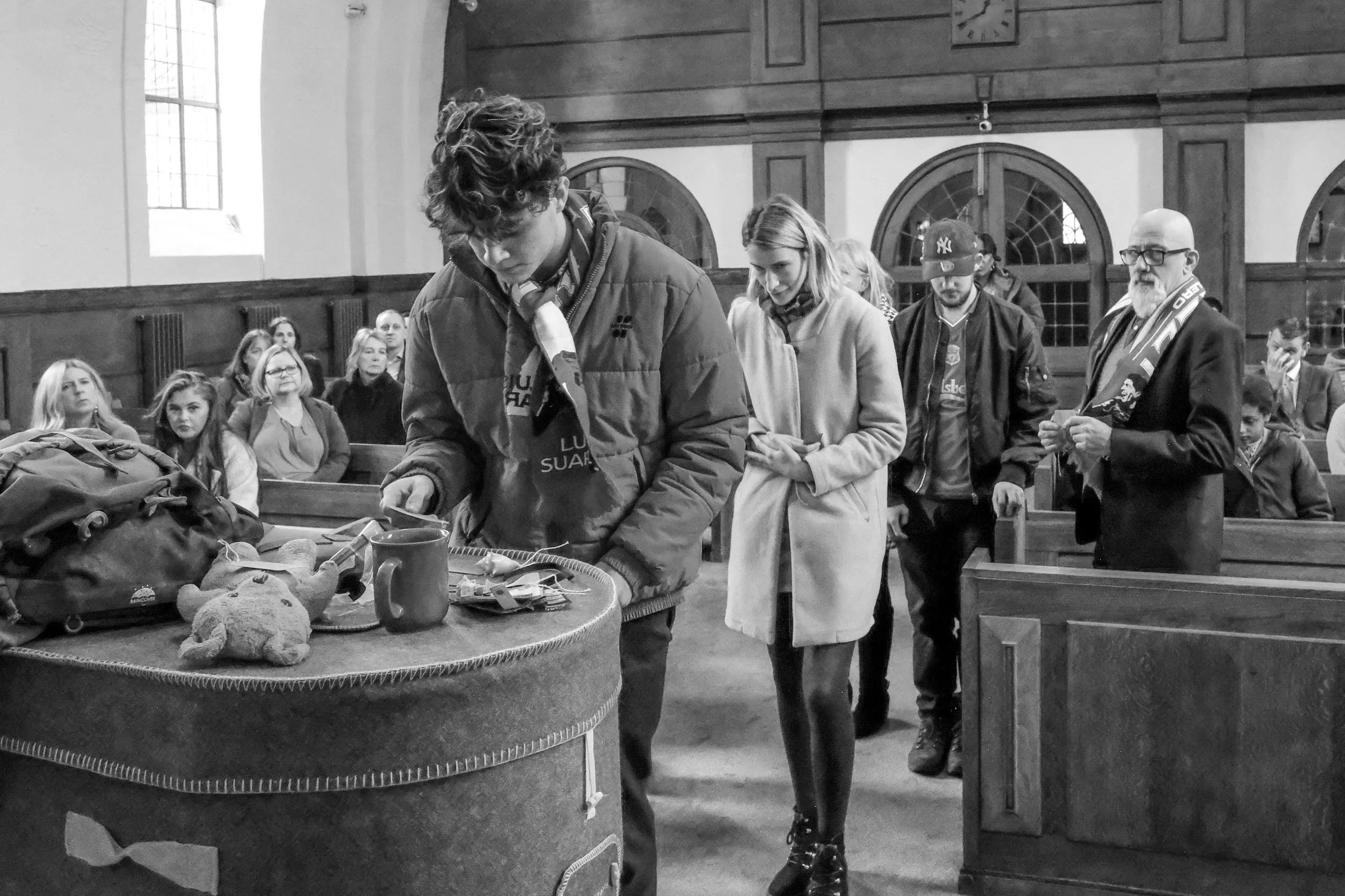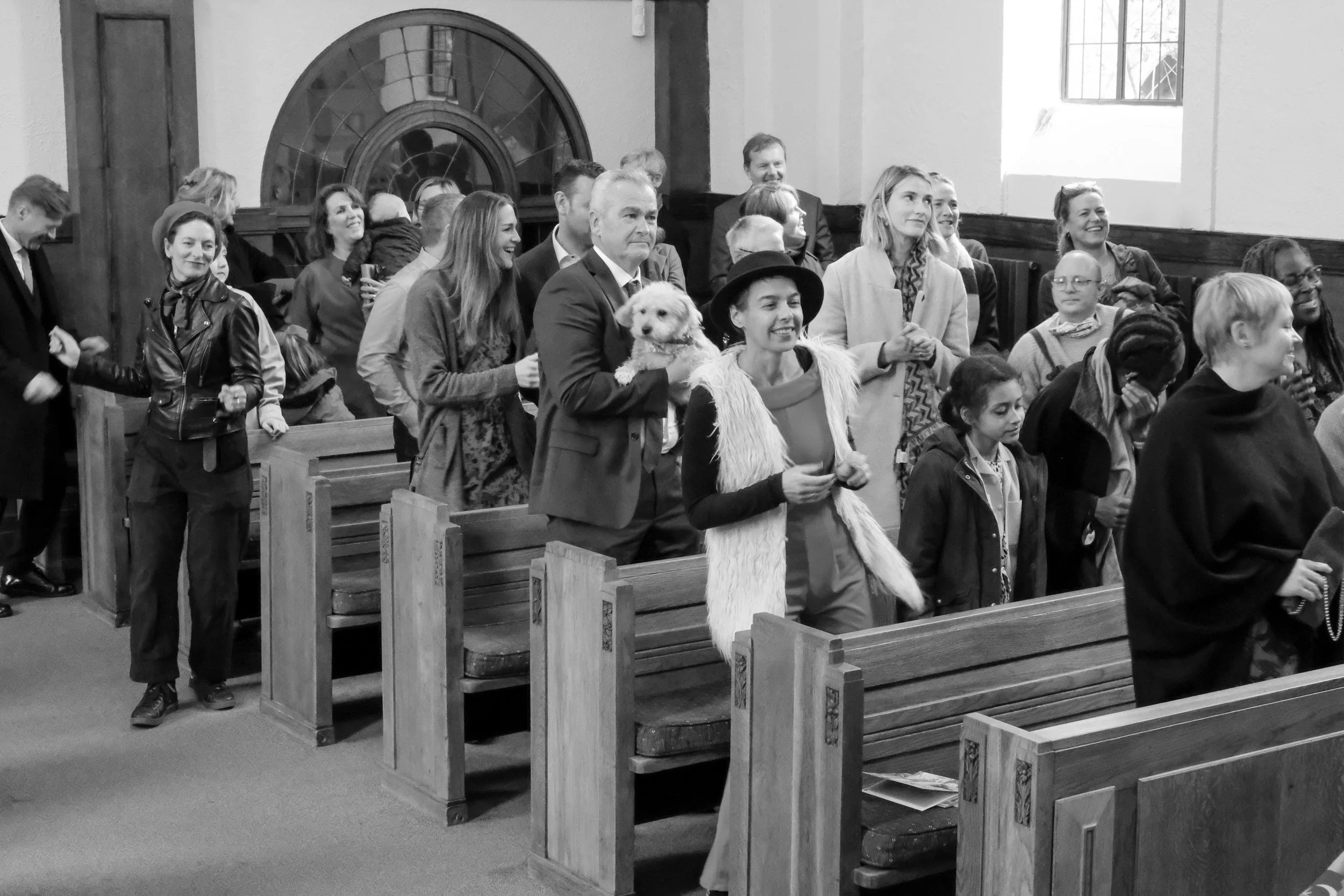
Funerals, Memorials and Celebrations of Life
As a Humanist funeral celebrant, my aim is to create a ceremony as unique as the person being remembered.
In my view, a funeral ceremony should strike a delicate balance between creating a safe space where people can grieve, express their emotions and collectively mourn whilst also celebrating the individual and their life in a way that is authentic and true to them. It allows people to come together and share an experience that marks the end of the person’s physical body and is often an integral part of the grieving process.
Non-religious funerals focus primarily on the person who has died, rather than promoting ideas of an afterlife. This approach ensures that everyone in attendance can connect with what is being shared, creating a more meaningful experience for all.
My aim is to work with families and friends to co-create an authentic and bespoke send-off. This involves meeting with those organizing the funeral and having a deep, gentle conversation about their loved one - remembering them for who they were and discussing what was meaningful to them. This helps me understand the person's unique spirit and create a ceremony that truly honours their individual story.
Humanist funerals offer a personal and fitting way to say goodbye to those who have lived without religion. They honour the person who has died with a non-religious ceremony, focusing on the life they led, the relationships they forged, and the legacy they left.
Based in South Wales, I work with families along the M4 corridor, predominately Cardiff, Vale of Glamorgan, Barry, Penarth, Newport, Swansea, the Valley and beyond. View all areas I serve.
How I create a ceremony for your loved one
Getting Started - No Pressure
If you would like to chat to see if I'm the right celebrant for you, or if you have any questions, please do get in touch by email or by phone – I will never make you feel pressured into choosing me! If you do decide you'd like me to conduct the ceremony, we can check availability and discuss your plans and thoughts about the funeral.
Our Planning Meeting
Depending on your needs, we can meet in person at your home, over the phone, or via video call. I usually meet with the person arranging the funeral, but family members or friends often join us too. We'll spend an hour or two discussing what kind of ceremony feels right and what you'd like included - poetry, music, readings, and speakers. If you're unsure, I can offer tailored suggestions and support for anyone who wants to contribute.
Remembering Your Loved One
We then spend the majority of our time discussing the person who has died - what their life looked like, what was important to them, and I listen as you share significant memories and stories. This allows me to get to know them through you, meaning their unique personality can be reflected throughout the ceremony. I usually have enough to write after one visit, though I'm always willing to meet again if needed.
Your Ceremony Script
I will then write the ceremony for you, and you'll have the opportunity to read it and make any amendments you'd like.
The Day Itself
On the day, I'll arrive early to liaise with staff and the Funeral Director (if you have one) to double-check that everything is in order and runs smoothly. I will conduct the funeral in the location of your choice with professionalism and warmth.
Afterwards
In the days after the funeral, I'll email a copy of the script for you to keep as a lasting memory.
Frequently Asked Questions
-
Not at all. A humanist funeral is for anyone without religion who wants a funeral based on the perspective that every life is individual and valuable. It’s the perfect option for people who want a sincere, personal reflection on the life of their loved one.
As a humanist, I don’t perform any acts of religious worship – but I understand that for some mourners faith may be important and comforting to them and as such I always allow time for private prayer. Equally, if you want to sing or play a much loved hymn because of the memories & associations it brings back, that is ok.
-
Although each ceremony is unique, they often follow a similar pattern and can look something like this:
Introductory Music
Welcome and Opening Words
Thoughts on life and death
Poetry or reading // by myself or family/friends
Tribute // an outline of the person's life and personality
Reflection // some quiet time to reflect on what you've heard, either in silence or with a more reflective piece of music
The committal // when the curtains are closed or the coffin is lowered. This is often the most emotive part of the ceremony
Closing words // including thanks and information about any wake or meet after
Final music
I will support you throughout the whole process.
-
Most crematorium chapels have specified time slots which typically allow 20-25 minutes with additional time to enter and exit. This might seem quite short but it is enough time to run a ceremony such as the one outlined above without feeling time pressure. If you are unsure whether this will be enough time, there is the option to arrange/book a double slot and it would be best to speak to the Funeral Director or the chapel about this.
Sometimes there may be two parts to a ceremony, for example at a burial where there is usually an indoor service and then a committal at the graveside. There are usually no specified time slots at the graveside or in other locations you may wish to conduct a ceremony (e.g. home, garden community centre, pub...) allowing for more flexibility, although weather and temperature may well be a consideration.
Finally, memorials - these can be even more flexible again and can be held anywhere with no time restrictions.
We can look at alternative payment plans to suit your particular need.
-
Absolutely - typically there are three music pieces and two poetry / readings but you are able to choose what is appropriate. More often than not, the second piece of music which is placed in the middle of the ceremony is 'reflective', meaning its slower and calmer. The third piece or exit music is usually a little more upbeat - this helps with the emotional flow of the ceremony but again, you are able to choose what is appropriate.
-
Please see a detailed outline of pricing here.
Questions Not Asked Frequently Enough
-
I’m happy to talk about planning for your funeral – be that in general terms, or if you already know your time is limited and you would like me to help you prepare the detail of it. Articulating wishes before you die can really help loved ones through the difficult time to come.
For more information, please click see information on Pre-Planning on my Humanist UK website page.
-
As long as you have the landowner’s permission, yes!




